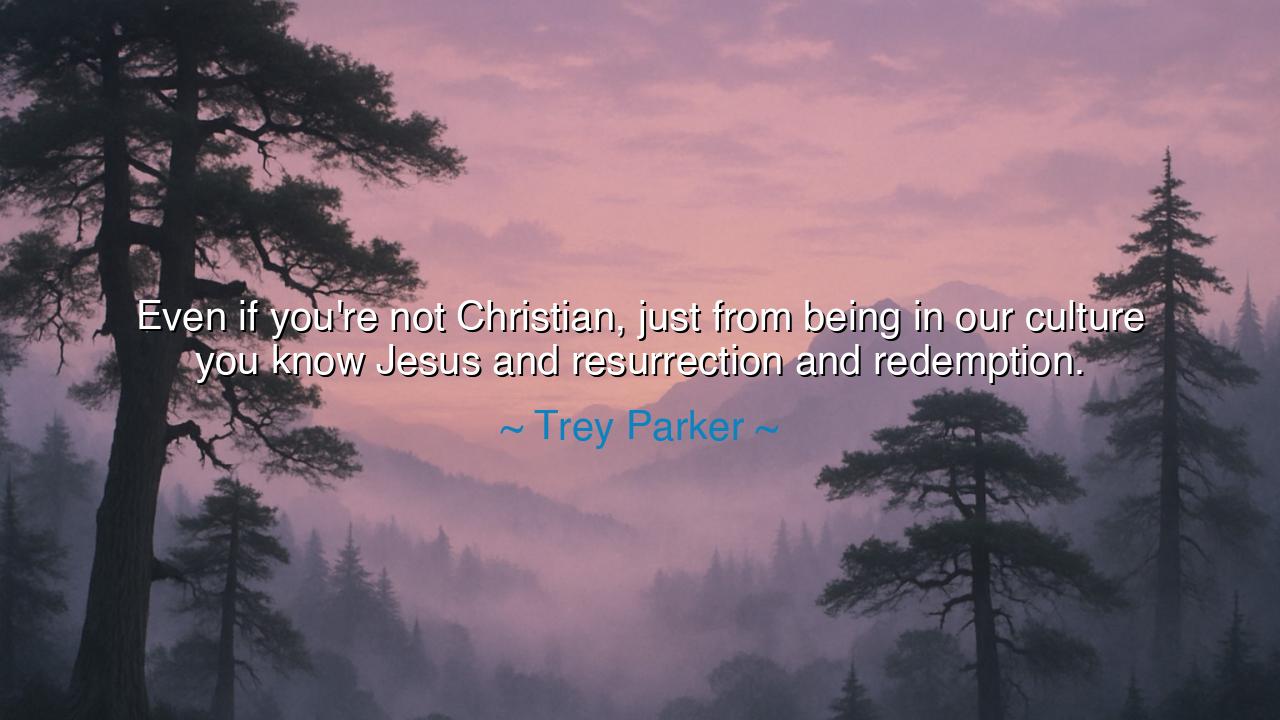
Even if you're not Christian, just from being in our culture you
Even if you're not Christian, just from being in our culture you know Jesus and resurrection and redemption.






The words of Trey Parker — “Even if you’re not Christian, just from being in our culture you know Jesus and resurrection and redemption” — strike at the heart of how deeply certain stories shape the collective soul of a civilization. Beneath the humor and simplicity of his phrasing lies a truth as vast as time itself: that myth, faith, and symbol are not confined by religion alone, but seep into the very consciousness of a people. Parker reminds us that some stories are so deeply woven into the fabric of human culture that they transcend belief — they become archetypes, mirrors in which all humanity can see itself.
In the style of the ancients, we might say: civilizations are built upon their stories, and the greatest of these stories live on long after their tellers are gone. The tale of Jesus, with its arc of suffering, death, resurrection, and redemption, has become one of humanity’s most enduring symbols. Even those who do not follow the Christian faith cannot escape its echoes — in art, in language, in the rhythm of our moral imagination. For the story of resurrection is the story of renewal itself, and the story of redemption is the eternal cry of the human heart to be made whole again.
The origin of Parker’s quote lies in his own work as a creator of stories, satire, and culture. As the co-creator of South Park, Parker has long explored the intersections between faith, society, and human contradiction. His words are not the confession of a believer, but the observation of an artist — one who recognizes that the figure of Jesus, and the idea of redemption, live not only in churches but in every narrative of struggle and transformation. To be born into a Western culture, he suggests, is to breathe the air of this mythos — even unconsciously. Our literature, our films, even our language are suffused with it. When we speak of “rising again,” “forgiving,” or “finding salvation,” we are speaking the language of redemption inherited from that ancient story.
The ancients themselves would have understood this deeply. Every great civilization has had its story of dying and rising — Osiris in Egypt, Persephone in Greece, Balder in Norse myth. These tales endure because they reflect something eternal: the cycle of death and rebirth, the triumph of life over despair, the renewal that follows loss. The story of Jesus, however, gave this universal rhythm a new and personal face. It spoke not only of the cosmos, but of the heart. It taught that redemption was not reserved for gods or kings but for all who seek forgiveness and transformation. Thus, whether one calls oneself Christian or not, the story has shaped the moral imagination of the modern world.
One might think of the civil rights movement, led by Martin Luther King Jr., as an embodiment of this very cultural inheritance. Though rooted in Christian theology, its message reached beyond the church — appealing to the universal longing for justice and renewal. King spoke of love conquering hate, of light overcoming darkness — the same pattern of resurrection and redemption that echoes in the Gospels. Yet his words moved even those who were not Christian, because they touched a truth older and deeper than doctrine: that humanity must die to its cruelty to be reborn into compassion.
Parker’s insight, then, is not theological but cultural and spiritual. He reminds us that we are shaped by the stories that surround us — that even unbelief is framed by belief. Whether one accepts the divinity of Jesus or not, His story has become part of the grammar of Western thought. Every tale of a hero who falls and rises again, every film or book where love redeems brokenness, every moment when a person forgives what seems unforgivable — all these are the descendants of that same narrative pattern. To live in this culture is to live in the long shadow of the cross and the light of the empty tomb.
Let this be the lesson for the generations: understand the power of the stories that shape you. You may not choose them, but they live within you nonetheless. Reflect on what they teach, and ask whether you embody their highest truths. If resurrection is the triumph of hope over despair, then live as one who helps others rise. If redemption is the reclaiming of what is broken, then seek to heal, not to harm. You do not need to be a Christian to understand this, for the message is larger than creed: that all who fall may stand again, that all who wander may return, and that even the darkest night carries within it the promise of dawn.
And so, Parker’s words remind us of a profound and humbling truth: that culture is the memory of the soul. Whether through faith or through art, humanity carries forward the story of redemption, not as dogma, but as destiny. The wise will listen, and the compassionate will live it — for to know the story of Jesus, even unconsciously, is to know that within every life lies the chance to be remade, renewed, and resurrected into something greater than before.






AAdministratorAdministrator
Welcome, honored guests. Please leave a comment, we will respond soon